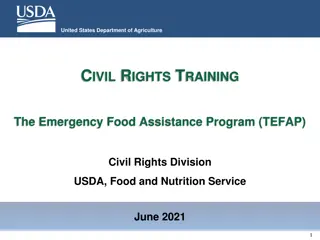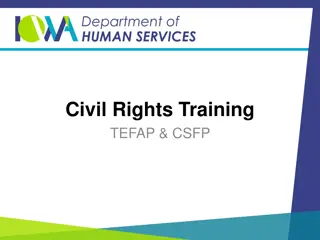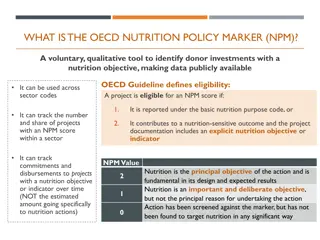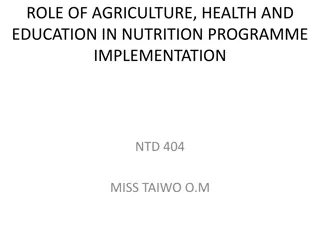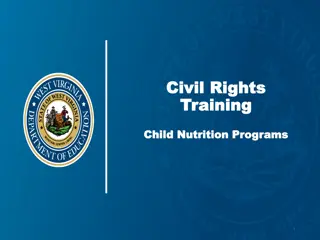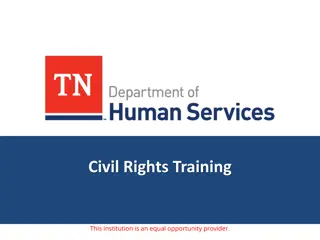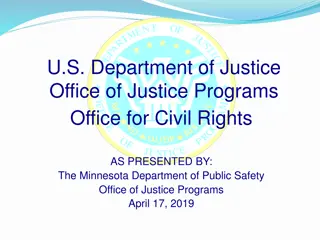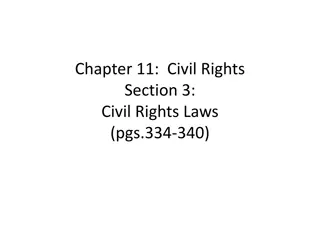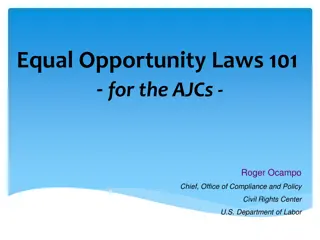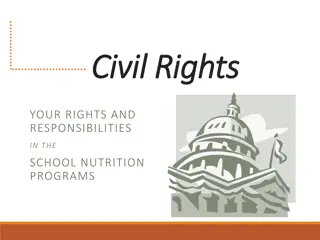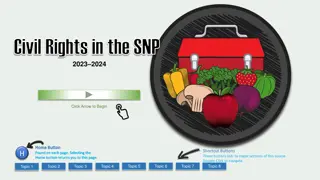Understanding Civil Rights Requirements in Child Nutrition Programs
This comprehensive guide outlines the civil rights obligations in Child Nutrition Programs, emphasizing equal treatment, knowledge of rights, and the elimination of barriers. It covers USDA requirements, regulations, and legislation such as Title VI, Americans with Disabilities Act, Title IX, and Age Discrimination Act, ensuring non-discrimination in programs receiving federal funds.
Download Presentation

Please find below an Image/Link to download the presentation.
The content on the website is provided AS IS for your information and personal use only. It may not be sold, licensed, or shared on other websites without obtaining consent from the author. Download presentation by click this link. If you encounter any issues during the download, it is possible that the publisher has removed the file from their server.
E N D
Presentation Transcript
USDA Civil Rights Requirements and Child Nutrition Programs Nebraska Department of Education Nutrition Services Revised 1/2015 1
Goals of Civil Rights Equal treatment for all applicants and beneficiaries Knowledge of rights and responsibilities Elimination of illegal barriers that prevent or deter people from receiving benefits Dignity and respect for all 2
Authority Programs receiving USDA funds must follow civil rights regulations and policy: Civil Rights Regulations are intended to assure benefits of Child Nutrition Programs are made available to all eligible people in a non-discriminatory manner. All sponsors receiving Federal $$ must implement Civil Rights requirements to be eligible for the program. 3
Authority Programs receiving USDA funds must follow civil rights regulations and policy: Food and Nutrition Service (FNS) 113-1 regulations cover these programs: National School Lunch, Breakfast and Special Milk Programs Summer Food Program Food Distribution Program Child and Adult Care Food Program www.fns.usda.gov/cr/crregulation.htm 4
Civil Rights Legislation Title VI of the Civil Rights Act of 1964: prohibits discrimination based on race, color, and national origin in programs and activities receiving Federal financial assistance. The Americans with Disabilities Act of 1990: prohibits discrimination on the basis of disability. 5
Civil Rights Legislation Title IX of the Education Amendments of 1972: prohibits discrimination based on sex under any education program or activity receiving Federal financial assistance Section 504 of the Rehabilitation Act of 1973: prohibits discrimination based on disability 6
Civil Rights Legislation Age Discrimination Act of 1975:prohibits discrimination based on age in programs or activities receiving Federal financial assistance. The Personal Responsibility and Work Opportunity Reconciliation Act of 1996 (PRWORA): Enforcement of Title VI of the Civil Rights Act of 1964 and Related Statutes in Block Grant Type Programs. 7
Civil Rights Legislation Civil Rights Restoration Act of 1987: clarifies the intent of Congress as it relates to the scope of Title VI of the Civil Rights Act of 1964 and related nondiscrimination statutes to ensure nondiscrimination in all programs and activities of a recipient, whether those programs and activities are federally funded or not. 8
Civil Rights Legislation USDA Departmental Regulation 4330-2: ensures compliance with and enforcement of the prohibition against discrimination in programs and activities funded in whole or in part by the USDA. USDA Regulation 7 CFR Part 16, ensures equal opportunity for religious organizations, to compete on an equal footing with other organizations for USDA assistance. 9
Civil Rights Training USDA State Agency Local Agencies Frontline Staff 10
Protected Classes - Race - Color - National origin - Sex - Age - Disability 9
SFA Responsibilities for Civil Rights Training #1 Collection and Use of Data #2 Effective Public Notification Systems #3 Complaint Procedures #4 Conflict Resolution 12
Civil Rights SFA Responsibilities #5 Compliance Review Techniques #6 Resolution of Noncompliance #7 Requirements for Reasonable Accommodations of Persons with Disabilities #8 Requirement for Language Assistance #9 Customer Service 13
USDA Civil Rights Requirements and Child Nutrition Programs #1 Collection and Use of Data 14
Obtaining Ethnic/Racial Data Voluntary self-identification or self- reporting (preferred method) Income application: Household applications that are completed each year and submitted to the SFA have a section for the household to identify their ethnic and racial data 15
Obtaining ethnic/racial data If a household chooses not to provide ethnic/racial information, you may use one of the following 2 methods: 1) Visual identification 2) Personal knowledge, records or other documentation your district possesses that identifies household ethnic/racial data. 16
2 Ethnic Categories Hispanic or Latino persons of Cuban, Mexican, Puerto Rican, South or Central American or other Spanish culture or origin regardless of race. Not Hispanic or Latino 17
5 Racial Categories American Indianor Alaskan Native Asian Black or African American Native Hawaiian or Other Pacific Islander White http://www.fns.usda.gov/cr/crregulation.htm 18
USDA Civil Rights Requirements and Child Nutrition Programs #2 Effective Public Notification Systems 19
Program Availability Public Notification Complaint Information Nondiscrimination Statement 20
Methods of Public Notification Public Release (required) Post And Justice for All poster (required) Other methods of public notification (optional) 21
Public Release Must include information on: Eligibility Benefits & Services (i.e. free or reduced price meals) Program availability Applicant rights and responsibilities 22
Public Release Must include information on, cont d: Procedures for filing a complaint Non-discrimination policies Any programmatic changes (i.e. changing location of a meal site) 23
And Justice For All Poster All programs participating in Child Nutrition Programs must display the USDA s non-discrimination poster in a prominent area where participants and potential participants have access 24
And Justice For All Poster Must be posted at every food service/preparation site In each cafeteria where meals are served Other possible locations: In offices where free & reduced determinations are made Entrance to facility Must be 11 x 17 format Posters may be obtained from NDE NS 25
Non-Discrimination Statement Usage Information The full statement is the preferred statement on all documents any time the USDA food programs are referred to in brochures, bulletins, leaflets, and letters The full statement must be used in documents that are more than 1 page 26
Examples which require the Nondiscrimination Statement: F/R Meal Appls. Parent/Student Handbooks Employee Handbooks Newsletters Brochures Print or broadcast advertisements Flyers Websites Menus not required 27
Nondiscrimination Statement Long Version The U.S. Department of Agriculture prohibits discrimination against its customers, employees, and applicants for employment on the bases of race, color, national origin, age, disability, sex, gender identity, religion, reprisal, and where applicable, political beliefs, marital status, familial or parental status, sexual orientation, or all or part of an individual s income is derived from any public assistance program, or protected genetic information in employment or in any program or activity conducted or funded by the Department. (Not all prohibited bases will apply to all programs and/or employment activities.) If you wish to file a Civil Rights program complaint of discrimination, complete the USDA Program Discrimination Complaint Form, found online at http://www.ascr.usda.gov/complaint_filing_cust.html, or at any USDA office, or call (866) 632-9992 to request the form. You may also write a letter containing all of the information requested in the form. Send your completed complaint form or letter to us by mail at U.S. Department of Agriculture, Director, Office of Adjudication, 1400 Independence Avenue, S.W., Washington, D.C. 20250-9410, by fax (202) 690-7442 or email at program.intake@usda.gov. Individuals who are deaf, hard of hearing or have speech disabilities may contact USDA through the Federal Relay Service at (800) 877-8339; or (800) 845-6136 (Spanish). 28
Nondiscrimination Statement Short Version If the material or document is too small to permit the full statement (previous slide) to be included, the material MUST, at a minimum, include: USDA is an equal opportunity provider and employer. 29
Nondiscrimination in Images When using graphics / images, reflect diversity and inclusion. http://www.ars.usda.gov/is/graphics/photos/ 30
USDA Civil Rights Requirements and Child Nutrition Programs #3 Complaint Procedures #4 Conflict Resolution 31
Complaint Procedure Plan SFAs and Institutions are required to develop and implement a written procedure to handle any discrimination complaint that may be received. 32
Civil Rights Complaints Allege that discrimination has occurred in violation of one of the protected classes Race Color National origin Sex Age Disability 33
Discrimination is when an individual or group of individuals are: Delayed benefits or services Denied benefits or services Treated Differently than others to their disadvantage Given Disparate Treatment 34
Where Do They Send the Complaint? Complainants may choose to: Contact USDA directly or Contact NDE NS directly, or Notify the SFA of their complaint SFAs and Institutions must forward all discrimination complaints received regarding Child Nutrition Programs to NDE NS within 5 working days 35
Procedures for Filing a Complaint 1. Right To File A Complaint Any person alleging discrimination based on race, color, national origin, sex, age, or disability has a right to file a complaint within 180 days of the date of the alleged discriminatory action. 36
Procedures for Filing a Complaint 2. Verbal Complaints A complaint does not need to be written by the person alleging that discrimination has occurred. If the complaint is verbal, the SFA needs to record the complaint for the person. 37
Procedures for Filing a Complaint 3. Acceptance It is the SFAs and Institutions responsibility to accept the complaint and to be able to do so requires that you collect certain information. The complaint is then forwarded to the appropriate officials for processing. 38
How to Handle a Complaint Use the Complaint Form Enter the Complaint on the Log Refer the complaint to the SFA's and Institution's civil rights contact person Report the complaint to NDE within 5 working days. 39
Conflict Resolution The USDA recommends using an Alternative Dispute Resolution (ADR) program ADR Definition: use of a neutral third party (usually a person acting as a facilitator) to resolve informally a complaint of discrimination through use of various techniques such as fact finding, mediation, peer panels, facilitation, ombudsman support, or conciliation. www.fas.usda.gov/Admin/civilrights/conflictres.asp 40
Civil Rights Complaint Log Log must be dated and kept for 3 years + current year, even if no complaints have been received 41
Civil Rights (CR) Binder Separate sections for 1) SFA's and Institution's CR complaint procedure, 2) CR complaint Log, 3) Copies of CR complaint forms An information sheet that identifies the Civil Rights coordinator for the SFA 42
USDA Civil Rights Requirements and Child Nutrition Programs #5 Compliance Review #6 Resolution of Noncompliance 43
Information for SFAs and Institutions Nutrition Services will ask: Have you ever received any written or verbal complaints alleging discrimination? If YES, have these complaints been reported to the State Agency? What is your policy to handle a complaint of discrimination? 44
Information for SFAs and Institutions No separation based by race, color, sex, disability, age or national origin in: Meal time Seating arrangements Serving lines Eating areas 45
Information for SFAs and Institutions Foreign language translations are available USDA poster displayed in prominent place Correct nondiscrimination statement on program materials Incorrectly denied F/R applications are not disproportionately composed of minority applications Disabled students are provided program benefits 46
Resolution of Noncompliance Civil Rights findings during the Review require a Corrective Action Plan that ensures compliance with the FNS 113-1 Instruction An acceptable corrective action plan must be submitted Failure to respond or correct the finding may result in suspension or termination of financial assistance 47
USDA Civil Rights Requirements and Child Nutrition Programs #7 Reasonable Accommodations of Persons with Disabilities 48
Accommodating Children With Special Dietary Needs
Federal Regulations The Rehabilitation Act 1973 (Section 504) and The Americans with Disabilities Act 1990 Individuals with Disabilities Education Act (IDEA) USDA Regulations 7 CFR 15b 7 CFR 210 and 220








